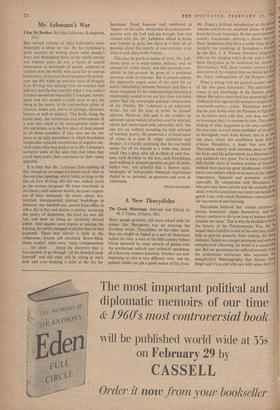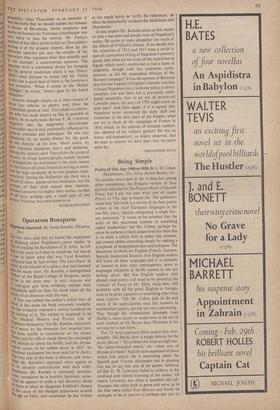A New Thucydides
The Greek Historians. Selected and Edited by M. I. Finley. (Chatto, 30s.)
MOST people probably still leave school with the notion that Herodotus was an amusing but frivolous writer. Thucydides, on the other hand, they are taught to regard as a sort of Mominsen before his time, a man of the fifth century before Christ endowed by some miracle of genius with the intellectual outlook and technical equipment of a first-rate modern historian. Scholars are now beginning to take a very different view; and the general reader can get a good notion of this from
Mr. Finley's brilliant introduction to the prei4 ‘1 ie ir volume and from his excellent choice of sat11131, j from the Greek historians. He has used nineteeall century translations, altering a phrase here 30 v there. Sometimes they have a rather fusty air,. ticularly the rendering of Xenophon's Analair by the Rev. J. S. Watson (Porson's biograph0 who cut his nagging wife's throat, and is still's' latest clergyman to be sentenced for murder $ this country). Still, these versions convey a 8q, deal more of the original than we should get fr(10, the chatty colloquialism of the Penguin sch0 What is wrong with the general reader's notiee of the two great historians'? The enormous el , crease in our knowledge of the Eastern ne01114.. whom Herodotus described has surprisingly 00°,1 vindicated him against the excessive scepticism nineteenth-century critics. Herodotus warns lit; that he puts down what the Persians or EgyPtial! or Scythians have told him, and does not wart us to assume that it is necessarily true. Thucydides,, 1 writing of what happened in his own country .0. his own time, is much more confident of his abillt)! to distinguish truth from fiction; and in at lea5t1 one, place where this confidence leads huh I° criticise Herodotus, it leads him into Thucydides clearly took immense pains to veriff his facts, and his achievement as a historian is hi i any standards very great. Yet in many respects ll ft falls farther short of modern notions of historic,' t method than does his great predecessor. Often be I leaves out matters which to us seem of the highest i importance, financial and economic evidence. especially. By comparison with Herodotus, his interests may seem narrow and his outlook Parc' chial; even his scepticism may seem raw beside Me gentle irony with which Herodotus communicate his vast stores of rare learning. Thucydides believed that 'certain patterns 0.f human behaviour' repeat themselves, 'and WO always continue to do so as long as human nature remains the same.' This is why he decided to write the history of the Peloponnesian War, for be hoped that a faithful record of his own time might help to prevent posterity from making the same mistakes. Taken as a simple statement and with ric metaphysical colouring, his belief is a reasonable one. But our generation has suffered severely frorn the pretentious charlatans who represent the metaphysical historiography that derives fron Hegel and Vico, and who can with some show ofl Plausibility claim Thucydides as an ancestor. It was inevitable that we should redress the balance in favour of Herodotus, whose simplicity and matter-of-factness the Victorian schoolmaster was 'cry naive to take for naiveté. Mr. Finley's analysis of the effect of this belief on Thucydides's writing is of the greatest interest. How far the elaborate speeches put into the mouths of the • characters may represent what they actually said is. for example, a controversial question. The speeches were a convenient device for bringing alit the general tendencies which it was Thucy- dIdes's main purpose to reveal and Mr. Finley thinks that a good deal of them, is the historian's tree invention. 'When it comes to the Melian Dialogue,' he writes. 'history goes by the board altogether: , Aristotle thought history as a mere record of brute fact inferior to poetry, and, from the i.‘ristotelian point of view, Thucydides is a histor- ian who has made history as like as possible to ,,Poetey, In an early book the late F. M. Cornford 'tiggested that the apparently ultra-prosaic rlinoydides was in fact profoundly influenced by Poetical outlooks and techniques. He was also tLannenced, by no means always for the good. 1°Y the rhetoric of his time, which seems, by r‘aler Athenian standards, heavy and elaborate the century after Thucydides the grasp of rhetoric on Greek historiography rapidly became !, stranglehold; its dominance is the main reason tor the failure of Greek historical writing to main- tain the high standards of its two greatest repre- sentatives. During the Hellenistic age there was a sc,Isnol of sober, matter-of-fact historians, but the ''rYness of their style caused their rhetoric- Obsessed posterity posterity to neglect their works—so that °I all their writings only a small part of one
author, Polybius, has come down to us. '
HUGH LLOYD-JONES







































 Previous page
Previous page